Many people take MCT oil because they're rich in “good fat” and provide added energy and weight loss benefits.
MCT oils, found in coconut oils, have rock-solid science supporting their use. Not all MCT oil is created equal, though.
What you want is a highly pure and strongly effective MCT oil to improve your health and drop your body weight. We’ve rigorously reviewed and ranked the top MCT oils to find out which ones are the best.
1. Sports Research MCT Oil
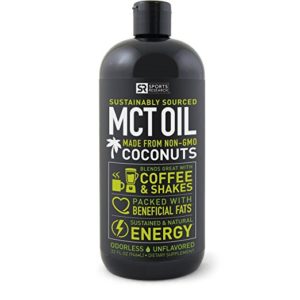
Click here for the lowest price on Amazon
The MCT oil made by Sports Research comes in a generously-sized 32 oz bottle that’s BPA free, and its only ingredient is MCT oil from coconuts that are certified non-GMO.
With ratios of caprylic acid, capric acid, and lauric acid that are nearly 1:1:1, it’s a great balance of the primary medium chain triglycerides.
2. Viva Naturals MCT Oil
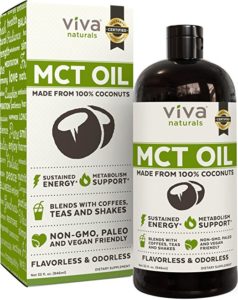
Click here for the lowest price on Amazon
Straight, simple, and to the point–Viva Naturals makes an MCT oil supplement that comes in a 32 ounce squeezable bottle and that uses solely coconut oil in its manufacturing process.
Cheaper MCT oils might rely on palm oil to balance out the formula, but not Viva Naturals.
3. Left Coast Performance MCT Oil
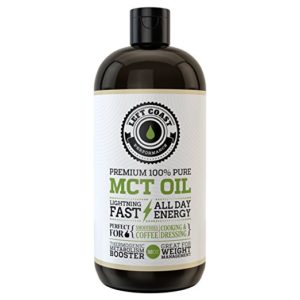
Click here for the lowest price on Amazon
Left Coast Performance makes an excellent MCT oil that really drives hard to deliver capric and caprylic acid (the “C8” and “C10” MCT oils).
Almost all of the fat in this liquid oil supplement is comprised of these two MCT oils, leaving very little lauric acid in the formulation. It’s made in America from coconuts grown in Malaysia, and it’s non-GMO certified.
4. Garden of Life MCT Oil
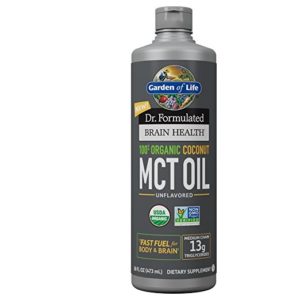
Click here for the lowest price on Amazon
Garden of Life always goes out of its way to distinguish itself, and in the case of their MCT oil, they do so by making sure the coconuts that are the sole source of the MCT oil in this supplement are organically sourced.
If organically-produced ingredients are a priority for you, Garden of Life is a great choice.
5. Onnit MCT Oil
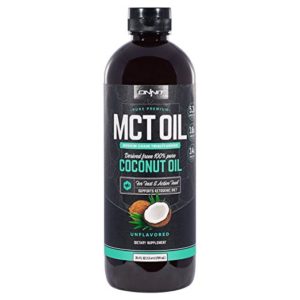
Click here for the lowest price on Amazon
Cutting-edge supplement juggernaut Onnit is a big name in the MCT oil market, and their product is a solid formulation that provides a good supply of caprylic and capric acid without hedging too much on lauric acid–it still constitutes 30% of the total fat content in the MCT oil formula.
6. Zhou MCT Oil Powder
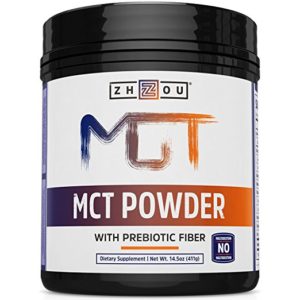
Click here for the lowest price on Amazon
Alongside Perfect Keto, Zhou Nutrition provides the best powdered MCT oil on the market right now. With acacia fiber to solidify the MCT oil, and no bulking or anti-clumping agents like some of the other powder-based MCT oil supplements out there, it’s a great travel companion or cooking ingredient.
As with any powdered MCT oil, it is not going to blend into a smoothie as easily, and it’s going to take some stirring to get it mixed into your coffee. Still, for air travel, it’s a lifesaver.
7. Perfect Keto MCT Oil Powder
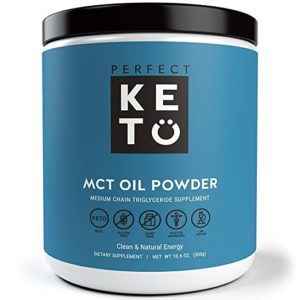
Click here for the lowest price on Amazon
One of the better powder-based options for MCT Oil comes from Perfect Keto, which uses acacia fiber to solidify MCT oil into a powdery substance for use in baking, homemade granola, or smoothies.
It’s not as easy to use as a liquid MCT oil supplement for something like MCT oil boosted coffee or a smoothie, but the lack of mess and the ability to travel with it makes it a good investment for someone who’s on the road a lot.
8. Bulletproof Brain Octane Oil
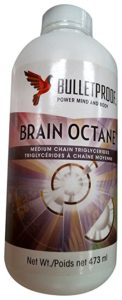
Click here for the lowest price on Amazon
This is the MCT oil that started it all, but now that it’s caught on, other companies have pulled a bit ahead. Bulletproof focuses on delivering just caprylic and capric acid, two of the MCT oils that are thought to have the greatest health benefits.
However, the smaller bottle means you’ll have to resupply more often, and other companies have extra perks like non-GMO certification.
9. Nature’s Way MCT Oil from Coconut
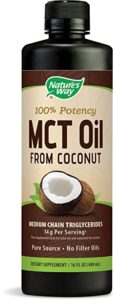
Click here for the lowest price on Amazon
Nature’s Way makes a solid MCT oil supplement that comes in a liquid bottle, but even in its maximum bottle size, it’s a little less volume than you’d get from some of the other liquid MCT oils out there.
Still, it’s 100% MCTs from coconut oil, so it’s hard to go wrong with this one.
10. Now Pure MCT Oil
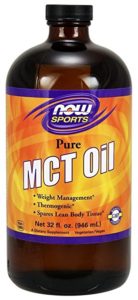
Click here for the lowest price on Amazon
Now Foods is a popular brand, but unfortunately has a reputation of cutting corners to make products on the cheap. In the case of their MCT oil, it’s a warranted reputation.
Unlike higher quality MCT oils on the market, Now Foods uses a mix of coconuts and palm kernel oil to derive its MCT oils.
This means it won’t have the same super-health composition of the medium chain triglycerides that you’d get from a product that’s pure coconut. In this case, there are better options out there for MCT oil.
MCT oil benefits and side effects
It’s rare for a supplement to get wildly popular for health benefits, weight loss, and exercise performance, but MCT oil appears to have done so.
With plenty of scientific research continuing to come out in support of the health benefits of medium chain triglycerides, and the sea change in the stance of nutritionists when it comes to plant-derived saturated fats, don’t expect MCT oil to fade away any time soon.
How is it possible for MCT oil to have benefits across so many different categories, and why doesn’t it get thrown in the “bad food” bin with most other sources of saturated fat? We’ll dig into the science to uncover the answers.
Benefits
Saturated fats have been much maligned for their tendency to increase biomarkers that are associated with increased risk of heart disease, and an increase in risk for metabolic syndrome as well.
But scientific research shows that MCT oil doesn’t have the same properties as other saturated fats–in fact, it appears it is beneficial with regards to your risk factors for heart disease and metabolic syndrome.
One study published in 2008 studied whether MCT oil would increase risk factors for metabolic syndrome compared to olive oil, the “gold standard” healthy oil that’s commonly recommended for heart and metabolic health (1).
Participants in the study were randomly assigned to a diet that contained 12% of its caloric content either from olive oil or from MCT oil. The standard American diet only contains about 2% of its calories in the form of MCT oil, so this represents a substantial increase.
The subjects were followed for four months. All of the subjects were overweight or obese, and several of them already had metabolic syndrome (high blood pressure combined with high blood sugar levels). After the researchers collected and analyzed the data, they found no changes in risk factors for metabolic syndrome in the group that consumed MCT oil.
In fact, all of the subjects in the MCT oil group who had metabolic syndrome at the beginning of the study did not have it anymore at the end.
This was the case for a few of the subjects in the olive oil group, but a few olive oil consumers went from healthy to having metabolic syndrome too.
As far as heart disease, there is even more robust evidence supporting the idea that MCT oils are processed differently by your body compared to other saturated fats.
A very large long-term study on nurses published in 1999 drew the distinction between medium chain triglycerides and long chain triglycerides like those found in animal products (2).
After adjusting for factors like age, smoking, and other potential confounding variables, the study found that medium chain triglyceride consumption did not increase risk for heart disease, while long-chain triglyceride consumption did.
More concrete evidence for the health benefits of MCT oil as it relates to weight loss comes from a 2010 research article in the scientific journal Pharmacological Research (3).
In it, the authors cite several research papers that illustrate how MCT oil can help you lose weight. Several early studies in rats showed the weight loss potential for MCT oil: rats fed an MCT oil rich diet showed a decrease in fat deposition and an increase in thermogenesis, i.e. the body’s metabolism (see: thermogenics).
Later studies tried to translate this success into studies in humans, and the results were equally impressive. When obese people are given a meal that’s enriched with MCT oil, their energy expenditure after the meal increases significantly compared to if the same amount of calories were added to the meal using long-chain fats.
Many studies have been conducted on MCT oils for weight loss, but in 2015, researchers in Australia pooled the results of 13 different trials totalling almost 800 subjects (4).
After pooling the data, the researchers found strong evidence that MCT oil supplementation leads to decreases in body weight, waist circumference, hip circumference, and total body fat content.
As with other weight loss supplements, your weight loss results will definitely be better along with reforms to your dieting and exercise habits, but MCT oil’s effects are definitely strong enough, and its ancillary health benefits are attractive enough, to consider it a cornerstone of a successful weight loss program.
Interestingly, MCT oil might even provide performance benefits to athletes. This was the claim of a 2009 study on recreational cyclists (5).
The subjects were given a 6 gram per day MCT oil supplement for two weeks, then completed a cycling time trial. The subjects given the MCT oil were able to cycle longer and harder compared to those given a long chain triglyceride supplement.
The researchers hypothesized that the MCT oil had increased the body’s ability to burn fat as fuel during high-intensity exercise, leading to better performance because of the increased energy available.
Side Effects
Overuse of MCT oil can lead to diarrhea and loose stools, as well as nausea and vomiting in rarer cases. These side effects have been well-known for many years, because one of MCT oil’s earlier use was as a major portion of the calories in ketogenic diets for seizure control (6).
However, at the doses that are most effective for MCT oil’s weight loss and health benefits, these side effects are rare. There are two strategies you can use to reduce the incidence of side effects if you are having problems. The first is adaptation: if a 12 gram dose of MCT oil causes gastrointestinal problems, you can start with a smaller dose–maybe 3 or 4 grams per day.
Then, over the course of a few weeks, you can work your way up to 12 grams. The other strategy is taking MCT oil with food, which seems to help control gastrointestinal problems, especially if you are taking higher doses of MCT oil.
One other consideration is how you store your MCT oil–while it won’t necessarily cause side effects, you shouldn't’ store your MCT oil near a window that will expose it to direct sunlight, especially if you have an MCT oil supplement that doesn’t have an opaque container.
MCT oil also shouldn’t be refrigerated. The cold won’t damage it, but it will solidify, making it much more difficult to measure out the right dosage and to mix it into your food or beverage of choice.
Recommended Dosage
Although there has been an explosion of studies on MCT oil for everything from weight loss to treating cardiovascular disease to improving athletic performance, there isn’t a clear consensus on what the optimal dose is.
For now, the best route is to copy the protocols of the most successful scientific studies, since these are where the best results have been demonstrated.
Studies range from 5 to 20 grams of MCT oil per day, but right around 10-14 seems to be the midrange of the optimal dosage.
This is enough of a dosage to result in all of the positive health benefits of MCT oil, but should be low enough for most people to avoid some of the gastrointestinal
Recap
MCT oil is an incredibly popular supplement, and for good reason. There’s an impressive body of scientific evidence supporting its use as a health supplement to decrease risk factors for metabolic syndrome and heart disease, as well as strong support for its weight loss benefits.
It can help you lose weight, decrease your waist size, and improve your metabolic health all at the same time. On top of this, it might even be effective as a performance enhancer for endurance athletes.
The only major side effects of MCT oil use are gastrointestinal problems, and they are rare at the doses used in scientific research studies.
It’s likely that studies on MCT oil’s benefits will continue to roll in as its potential for treating and preventing other health conditions is explored.
https://bodynutrition.org/mct-oil/ http://bodynutritionorg.blogspot.com/2018/03/ranking-best-mct-oil-supplements-of-2018.html
No comments:
Post a Comment